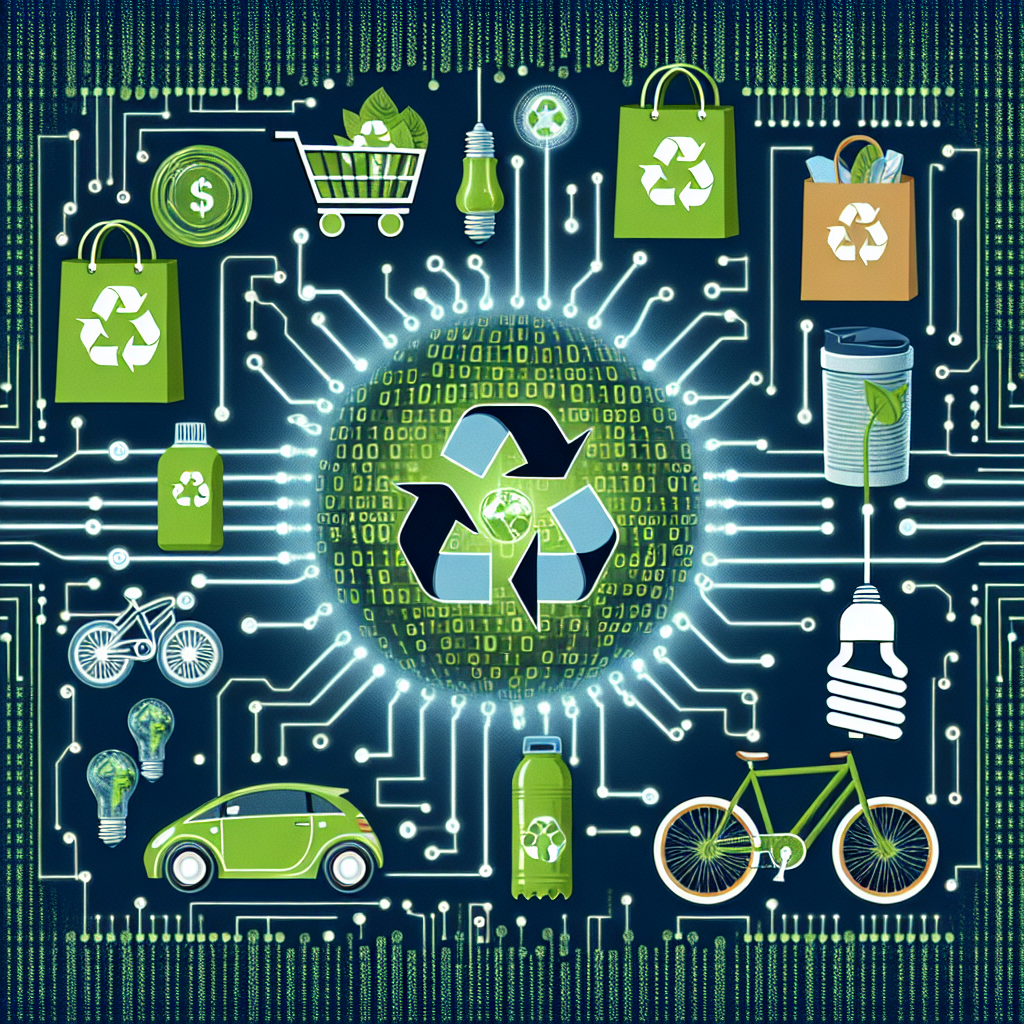Artificial intelligence (AI) is playing an increasingly important role in promoting eco-friendly consumer behavior. With the rise of environmental concerns and the need for sustainable living, AI technology has the potential to drive significant changes in how consumers make purchasing decisions and interact with products and services. In this article, we will explore the various ways in which AI is being used to promote eco-friendly consumer behavior and discuss the benefits and challenges that come with this technology.
One of the key ways in which AI is promoting eco-friendly consumer behavior is through personalized recommendations. AI algorithms can analyze consumer behavior and preferences to provide tailored recommendations for products and services that are environmentally friendly. For example, AI-powered platforms can suggest eco-friendly alternatives to products that consumers regularly purchase, based on factors such as their past purchases, browsing history, and environmental impact. By providing personalized recommendations, AI can help consumers make more informed choices that are aligned with their values and beliefs.
Another way in which AI is promoting eco-friendly consumer behavior is through the use of smart devices and Internet of Things (IoT) technology. AI-powered devices such as smart thermostats, lighting systems, and appliances can monitor energy consumption and suggest ways to reduce waste. For example, a smart thermostat can learn the preferences of a household and adjust the temperature settings accordingly to save energy. Similarly, smart lighting systems can automatically adjust brightness levels based on natural light and occupancy, reducing energy consumption. By leveraging AI technology, consumers can minimize their environmental impact and save money on utility bills.
AI is also being used to drive sustainability in the fashion industry. The fashion industry is one of the most polluting industries in the world, with significant environmental impacts from textile production, dyeing processes, and garment waste. AI technology is being used to optimize production processes, reduce waste, and promote sustainable practices in the fashion industry. For example, AI algorithms can help designers create more sustainable clothing designs by analyzing materials, production processes, and consumer preferences. Additionally, AI-powered platforms can help consumers make more sustainable fashion choices by providing information on the environmental impact of different brands and products.
In addition to promoting eco-friendly consumer behavior, AI is also being used to track and monitor environmental trends and changes. For example, AI algorithms can analyze satellite imagery to monitor deforestation, track wildlife populations, and detect environmental pollution. By leveraging AI technology, researchers and policymakers can gain valuable insights into environmental issues and take proactive measures to address them. Furthermore, AI can help predict and mitigate the impact of natural disasters, such as floods, hurricanes, and wildfires, by analyzing data and providing early warning systems.
While AI has the potential to drive significant changes in promoting eco-friendly consumer behavior, there are also challenges and limitations that need to be addressed. One of the main challenges is the lack of transparency and accountability in AI algorithms. As AI technology becomes more sophisticated and autonomous, there is a risk of bias and unethical behavior in decision-making processes. It is essential for companies and policymakers to ensure that AI algorithms are transparent, accountable, and aligned with ethical principles to promote eco-friendly consumer behavior.
Another challenge is the potential impact of AI on the job market and workforce. As AI technology becomes more prevalent in promoting eco-friendly consumer behavior, there is a concern that it may lead to job displacement and economic inequality. It is crucial for companies and policymakers to implement policies and programs that support the transition to a more sustainable and inclusive economy, where technology is used to empower workers and promote green job creation.
In conclusion, AI has the potential to play a significant role in promoting eco-friendly consumer behavior by providing personalized recommendations, driving sustainability in various industries, and monitoring environmental trends. However, there are challenges and limitations that need to be addressed to ensure that AI technology is used responsibly and ethically. By leveraging AI technology in a transparent and accountable manner, we can harness its potential to drive positive changes in promoting sustainable living and protecting the environment.
FAQs:
1. How can AI help promote eco-friendly consumer behavior?
AI can help promote eco-friendly consumer behavior by providing personalized recommendations, driving sustainability in various industries, and monitoring environmental trends. By analyzing consumer behavior and preferences, AI algorithms can suggest eco-friendly alternatives to products and services. Additionally, AI-powered devices and platforms can help consumers reduce energy consumption, waste, and environmental impact.
2. What are some examples of AI technology promoting eco-friendly consumer behavior?
Some examples of AI technology promoting eco-friendly consumer behavior include personalized recommendations for eco-friendly products, smart devices that monitor energy consumption, and AI-powered platforms that track environmental trends. AI is also being used to drive sustainability in industries such as fashion, agriculture, and transportation.
3. What are the challenges and limitations of using AI to promote eco-friendly consumer behavior?
Some of the main challenges and limitations of using AI to promote eco-friendly consumer behavior include the lack of transparency and accountability in AI algorithms, the potential impact on the job market and workforce, and ethical concerns related to bias and decision-making processes. It is essential for companies and policymakers to address these challenges to ensure that AI technology is used responsibly and ethically.
4. How can consumers leverage AI technology to make more sustainable choices?
Consumers can leverage AI technology to make more sustainable choices by using AI-powered platforms and devices that provide information on the environmental impact of products and services. By taking advantage of personalized recommendations and sustainability features, consumers can make informed decisions that align with their values and beliefs.

